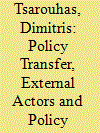| Srl | Item |
| 1 |
ID:
175822


|
|
|
|
|
| Summary/Abstract |
Turkey’s economic turmoil of today is reminiscent of an earlier era, during which instability, high inflation, and financial mismanagement ruled the day. Yet until recently, Turkey was celebrated as an economic success story, enjoying rising prosperity, high GDP growth, and a healthy fiscal outlook. How was that success possible? Which mechanisms allowed for successful policy reform and how did internal reform dynamics interact with exogenous factors? This article examines the effects of EU and IFI policy conditionality on Turkey, arguing that EU-induced conditionality is more effective compared to IFI conditionality. Further, this work demonstrates the formation of a domestic epistemic community, which evolved into an advocacy coalition and became a crucial pillar for policy reform. Finally, shrewd policy entrepreneurs used a favorable window of opportunity and aligned with the reformist coalition to overcome barriers to policy change.
|
|
|
|
|
|
|
|
|
|
|
|
|
|
|
|
| 2 |
ID:
164359


|
|
|
|
|
| Summary/Abstract |
To what extent does growing trade lessen the probability of inter-state conflict? This paper addresses this question by using the curiously under-studied dyadic relationship between Greece and Turkey. Measuring trade and foreign direct investment (FDI) volumes as well as tourism flows and by use of elite interviews with key actors from both countries, we find that economic relations have become stronger and more diverse over time, non-state actors now featuring prominently in deepening interaction. Such developments, however, fail to translate into conflict resolution at the political level. To account for these findings, we use a New Liberal approach, arguing that this helps us explain both enhanced plurality in bilateral economic exchange and the incompatibility of the two countries' respective conceptions regarding legitimate national borders.
|
|
|
|
|
|
|
|
|
|
|
|
|
|
|
|